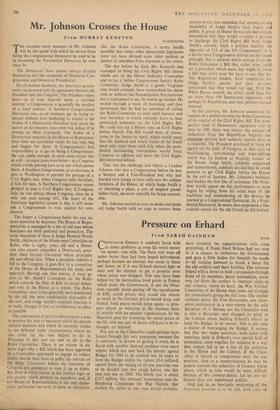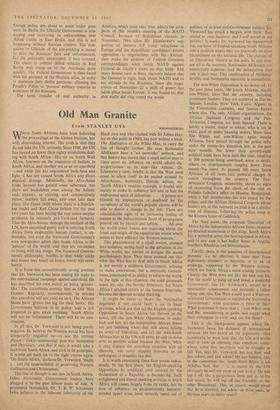Erhard Pressure on
From SARAH GAINHAM
BONN
CHANCELLOR ERHARD is suddenly faced with as many problems as even his worst enemy —no names—can wish. The Paris visit went off rather better than had been hoped beforehand; perhaps because no attempt was made to force any issues, or if it was Erhard showed fight at once and the attempt to get a promise over wheat prices was dropped. This may have been helped by the horrendous food prices in France which make the Government, if not the Presi- dent, equable about putting off the equalisation of EEC cereal prices; they would rise almost as much as the German prices would drop, and French food prices would jump again—a pros- pect almost as worrying as the German fears of trouble with the peasant organisations. So the Mansholt plan for trimming the cereal prices of the Six with one pair of shears will have to be re- thought, or retimed.
Yet, just as the Chancellor could perhaps have forced through this very unpopular measure (he is cautiously in favour of getting it over), he is faced with another internal problem even more urgent, which has sent back the already agreed Budget for 1964 to be combed out. In order to keep the Budget within the (about £5.4 milliard) agreed limits the raising of all war pensions was to be divided into two rough halves, one this year and one in 1965. The whole sum is about £13.7 million. The veterans' associations and the Bundestag Committee for War Victims that drafted the raises in one step would probably have accepted the apportionment with some grumbling, if Franz Josef Strauss had not seen in it a chance to embarrass the Government and gain a little kudos for himself—he needs it—by rushing forward to break a lance for the old soldiers and their families. The veterans helped with a threat to hold a procession through Bonn of its members; latent nationalism, never very far from the surface in veterans' clubs in any country, raised its head; the War Victims' Committee of the House then came out strongly for immediately giving the full rises. The smaller coalition party, the Free Democrats, saw them- selves outsmarted in a vote-winner by the wily Bavarian—F. J. Strauss, not the Chancellor who is also a Bavarian—and changed its mind in the Cabinet about backing Erhard's efforts to keep the Budget in its corsets. This is not only a matter of rearranging the Budget. It means, too, that two major questions, both laden with emotions, both in Erhard's own special field of economics, come together for solution in a way that cannot fail to be a test of his authority in the House and the Cabinet. If the Chan- cellor is forced to compromise over the war pensions, then as a counterbalance he may be pushed towards the reduction of German wheat prices, which in turn would be more difficult because of this covered defeat. Let no one say Strauss does not understand politics.
And, just as an inevitable weakening of the American position is to be felt, both sides of foreign policy are about to come under pres- sure. In Berlin the Ulbricht Government is con- tinuing and increasing its awkwardness over Allied transit in East Berlin, and this is not happening without Russian consent. The dele- gation to Ulbricht of the pin-pricking is meant to save the Russians' face and unfortunately, for the politically uneducated, it may succeed. The claim to control Allied vehicles in East Berlin may creep on to the Autobahn quite quickly. The Federal Government is then faced with the prospect of the Western allies, in order to maintain their Berlin garrisons, allowing the People's Police to 'process' military convoys as nominees of the Russians.
The same transfer of real authority in America, which must take time, affects the pros- pects of this month's meeting of the NATO Council. Increase of Republican , chances in November, 1964, after Mr. Eisenhower's sug- gestion of massive US troop reductions in Europe and the Republican candidates' known opposition to negotiations with Mr. Khrush- chev make the position of Federal Germany correspondingly weak inside NATO against General de Gaulle's views on that body. And many honest men in Bonn sincerely believe that the General is right, both about NATO and in his attitude to the Russians. Since the tragic events of November 22 a shift of power has taken place inside Europe. It was bound to; that shot really did ring round the world.







































 Previous page
Previous page